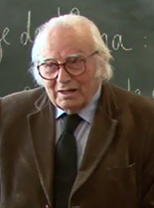U.Porto Memory
University of Porto Famous Alumni
Joaquim Sarmento
 |
Joaquim Sarmento 1916-2018 Engineer and university teacher |
Joaquim Augusto Ribeiro Sarmento, son of Joaquim Augusto Sarmento and Augusta de Magalhães Ribeiro Sarmento, was born in Porto, on 15 December 1916.
He studied at the Alexandre Herculano High School, took the preparatory classes for the Civil Engineering course at the Faculty of Sciences of the University of Porto (1933/1936), and the Civil Engineering course at the Faculty of Engineering of the University of Porto, which he completed in the academic year 1938/1939 with the final mark of seventeen out of twenty.
In 1940, he was appointed Second Assistant of the 1st Group (Civil Construction) at FEUP, being responsible for supervising practical works in Strength of Materials and Stability (1st and 2nd parts) and for the official technical services of the Laboratory of Material Testing.
In 1944, Joaquim Sarmento passed, with a unanimous vote, the PhD examinations in Civil Engineering at the Faculty of Engineering, and in the following year he was hired as First Assistant. He was then responsible for the theory classes of General Construction Materials and Processes (1944-1545/1956-1957) and of Strength of Materials and Stability, 1st part (1947-48/1956-57) and for supervising the practical assignments of General Construction Materials and Processes and of Reinforced Cement (which was later renamed Reinforced and Prestressed Concrete), and of Architecture.
In 1957, he was nominated Inspector of Public Works and Communication of the Superior Council of Overseas Development. He was responsible for issuing expert reports on development works in the overseas territories (Portuguese colonies), such as port works, sanitary engineering, bridges, roads and dams. He was also nominated for special missions in Cape Verde, Angola and Mozambique, represented the Ministry of Overseas Affairs near the Commission for the Review of Road and Airfield Terminology, and represented the Superior Council of Overseas Development near the Interministerial Commission for the Development Plan.
In 1961, he left the Ministry of Overseas Affairs and accepted a position as contracted Full Professor, of the 1st group at FEUP, to teach the theory of Strength of Materials.
In September of that same year, with the University of Coimbra, he participated in the 2nd Overseas Holiday Course, teaching "Cálculo das estruturas nos estados limites. Aplicação ao Betão Armado" [applications of reinforced concrete], in Luanda and Lourenço Marques.
In the following academic year (1962-1963), he was a jury member for the selection of researchers for the National Laboratory of Civil Engineering (1962), taught the theory of Strength of Materials and Stability Elements, and passed the exams for the position of Tenured Professor of the Faculty of Engineering of the University of (1963).
In this same Faculty, he chaired the subjects of Reinforced and Prestressed Cement and Strength of Materials (1963-1979), continued to teach Reinforced Concrete, and supervised a Seminar on Structures. He rose to the position of effective Full Professor in 1968 and directed the Faculty of Engineering between December 1973 and April 1974.
After he retired in 1986, Joaquim Sarmento participated as a jury member in many PhD exams in Civil Engineering, and in juries of the exams of extraordinary professor at FEUP.
His brilliant career in Engineering helped him join many institutes, associations and renowned academies. Joaquim Sarmento was a member of the Centre of Civil Engineering Studies, of the Institute for Advanced Culture, a member of the Superior Council of Public Works, a member of the International Association of Bridges and Structures and of the Portuguese Delegation to the "Comité Européen du Béton"; he is also a member of the American Concrete Institute, of the Portuguese Group of Prestressed Concrete of the Fédération Internationale de la Précontrainte and an Emeritus member of the Academy of Engineering. He has received many distinctions, for example, the Manuel Rocha Research Award, of the National Laboratory of Civil Engineering (1987), the Leonardo da Vinci Medal from SEFI (Société Européenne pour la Formation des Ingénieurs), which was awarded for the first time to a Portuguese person in 2003, and the Grand Cross of the Order of Public Education (2005).
Joaquim Sarmento remembers some of his excellent teachers during his university years, such as Professors Correia de Araújo, Teotónio Rodrigues, Almeida Garrett and Bonfim Barreiros, and the originality of his colleague Edgar Cardoso.
Some of his outstanding engineering works include the football stadium of Futebol Clube do Porto (the former Antas Stadium), the churches of Carvalhido and Antas, and the markets of Matosinhos and Bom Sucesso – these were the ones he enjoyed the most.
He enjoied listening to Bach and Ravel, and reading, especially the works of classical writers, such as Eça de Queirós, Aquilino Ribeiro and Fernando Namora, but also of modern writers, such as António Mega Ferreira and Miguel Sousa Tavares. In the field of Architecture, he admires the robustness of the Romance style and the art of Januário Godinho.
He lived in Porto, he also enjoys the countryside, in the company of his six children (5 daughters and a son) and his 14 grandchildren.
He died on April 10t, 2018, at the age of 101.
(Universidade Digital / Gestão de Informação, 2009)
Last updated: 2018-04-11 Webpage created on: 2025-06-24 08:58:21 Complaint Portal